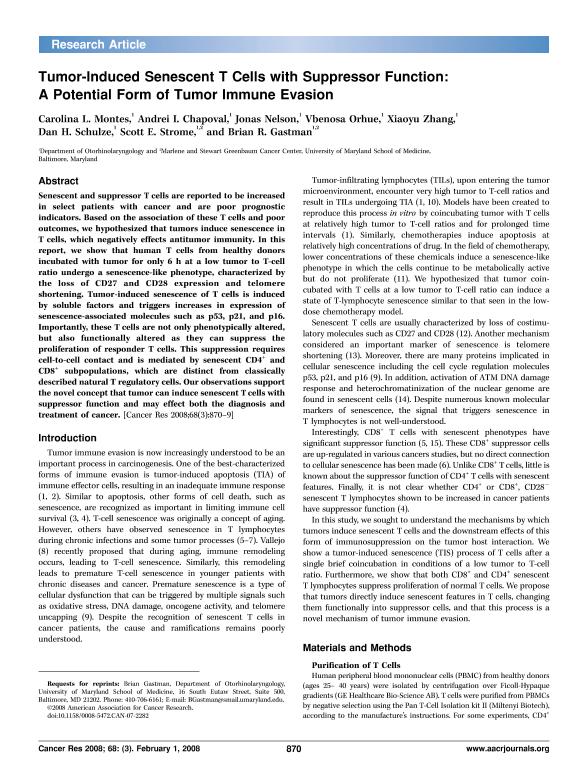Artículo
Tumor-induced senescent T cells with suppressor function: A potential form of tumor immune evasion
Montes, Carolina Lucia ; Chapoval, Andrei I.; Nelson, Jonas; Orhue, Vbenosa; Zhang, Xiaoyu; Schulze, Dan H.; Strome, Scott E.; Gastman, Brian R.
; Chapoval, Andrei I.; Nelson, Jonas; Orhue, Vbenosa; Zhang, Xiaoyu; Schulze, Dan H.; Strome, Scott E.; Gastman, Brian R.
 ; Chapoval, Andrei I.; Nelson, Jonas; Orhue, Vbenosa; Zhang, Xiaoyu; Schulze, Dan H.; Strome, Scott E.; Gastman, Brian R.
; Chapoval, Andrei I.; Nelson, Jonas; Orhue, Vbenosa; Zhang, Xiaoyu; Schulze, Dan H.; Strome, Scott E.; Gastman, Brian R.
Fecha de publicación:
02/2008
Editorial:
American Association for Cancer Research
Revista:
Cancer Research
ISSN:
0008-5472
e-ISSN:
1538-7445
Idioma:
Inglés
Tipo de recurso:
Artículo publicado
Clasificación temática:
Resumen
Senescent and suppressor T cells are reported to be increased in select patients with cancer and are poor prognostic indicators. Based on the association of these T cells and poor outcomes, we hypothesized that tumors induce senescence in T cells, which negatively effects antitumor immunity. In this report, we show that human T cells from healthy donors incubated with tumor for only 6 h at a low tumor to T-cell ratio undergo a senescence-like phenotype, characterized by the loss of CD27 and CD28 expression and telomere shortening. Tumor-induced senescence of T cells is induced by soluble factors and triggers increases in expression of senescence-associated molecules such as p53, p21, and p16. Importantly, these T cells are not only phenotypically altered, but also functionally altered as they can suppress the proliferation of responder T cells. This suppression requires cell-to-cell contact and is mediated by senescent CD4+ and CD8+ subpopulations, which are distinct from classically described natural T regulatory cells. Our observations support the novel concept that tumor can induce senescent T cells with suppressor function and may effect both the diagnosis and treatment of cancer. ©2008 American Association for Cancer Research.
Palabras clave:
Senescence
,
T cell
,
Tumor
,
Immunology
Archivos asociados
Licencia
Identificadores
Colecciones
Articulos(CIBICI)
Articulos de CENTRO DE INV.EN BIOQUI.CLINICA E INMUNOLOGIA
Articulos de CENTRO DE INV.EN BIOQUI.CLINICA E INMUNOLOGIA
Citación
Montes, Carolina Lucia; Chapoval, Andrei I.; Nelson, Jonas; Orhue, Vbenosa; Zhang, Xiaoyu; et al.; Tumor-induced senescent T cells with suppressor function: A potential form of tumor immune evasion; American Association for Cancer Research; Cancer Research; 68; 3; 2-2008; 870-879
Compartir
Altmétricas



